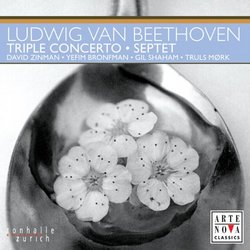| All Artists: Ludwig van Beethoven, David Zinman, Zurich Tonhalle Orchestra, Yefim Bronfman Title: Beethoven: Triple Concerto; Septet Members Wishing: 0 Total Copies: 0 Label: Arte Nova Classics Original Release Date: 1/1/2006 Re-Release Date: 4/11/2006 Genre: Classical Styles: Chamber Music, Forms & Genres, Concertos, Historical Periods, Classical (c.1770-1830), Instruments, Strings, Symphonies Number of Discs: 1 SwapaCD Credits: 1 UPC: 723721207151 |
Search - Ludwig van Beethoven, David Zinman, Zurich Tonhalle Orchestra :: Beethoven: Triple Concerto; Septet
 | Ludwig van Beethoven, David Zinman, Zurich Tonhalle Orchestra Beethoven: Triple Concerto; Septet Genre: Classical
FOUR GRAMMY AWARD WINNING ARTISTS ON ONE DISC. As Beethoven himself was well aware, his Concerto for Piano, Violin and Cello ? commonly called the "Triple Concerto" ? was unique in musical literature. No one had ever writ... more » |
Larger Image |
CD DetailsSynopsis
Album Description FOUR GRAMMY AWARD WINNING ARTISTS ON ONE DISC. As Beethoven himself was well aware, his Concerto for Piano, Violin and Cello ? commonly called the "Triple Concerto" ? was unique in musical literature. No one had ever written for this combination of solo instruments and orchestra. The Triple Concerto was first performed in Vienna in 1804, and apparently never again in Beethoven?s lifetime! The work was neglected for years and is still a little overshadowed by the other Beethoven concertos, but this is in large part because it is seldom heard due to its extraordinary requirements for three major virtuosi. This recording offers three of today?s leading soloists along with conductor David Zinman, whose Beethoven recordings have already become first choices with many listeners. Since making his debut at London?s Festival Hall in 1981, pianist Yefim Bronfman has regularly played with the most renowned European, American and Far Eastern symphony orchestras. He was! awarded the Avery Fisher Prize in 1991. Israeli-American violinist Gil Shaham (b. 1971) studied at Juilliard and in 1990 was awarded the coveted Avery Fisher Career Grant. Since then, he has pursued an extremely active international career and made numerous CD recordings. Gil Shaham plays a Stradivarius dating from 1699. Truls Mørk has long been one of the most renowned international cellists and plays with the world?s leading symphony orchestras and conductors. An enthusiastic chamber musician, he undertook a successful tour of the U.S. with violinist Gil Shaham and pianist Yefim Bronfman in 2003. Born in 1936, American conductor David Zinman has risen to the pinnacle of his career in the last decade. His discography of some 100 recordings has won five Grammys and two Grands Prix du Disque. Founded in 1868, the Zurich Tonhalle Orchestra is Switzerland?s oldest symphony orchestra. Included as a major bonus is a splendid performance of Beethoven?s early and massive chamber work masterpiece, the Septet, Op. 20. Similar CDs
|
CD ReviewsZinman, Tonhalle, Shaham, Mork & Bronfman: Brilliant Beethov Dan Fee | Berkeley, CA USA | 05/11/2006 (5 out of 5 stars) "Here we get part two of the ongoing series that seems to aim at getting all the Beethoven piano concertos, safely in the can. The familiar bottom line for this series? Get this CD right away. No matter who else already sits on your fav shelf for this music, you will find it quite easy to add this new recording of the Beethoven Triple Concerto, and the early Septet. Cheap price, too. But nothing cheap, nothing cheap at all about either the recorded sound, or the quality of these performances. If you have heard - and liked - the approach that Zinman & Tonhalle took to their prize-winning set of the complete Beethoven Symphonies (which deservedly earned the German record critics prize, and is also at budget prices on Arte Nova) - you can settle into your home system, or mp3 player, or car stereo for lots more of that same Beethoven - intelligent, vital, heartfelt. To recap. Zinman & Tonhalle have been influenced by all the paths opened up in the period instrument performances of baroque and classical music over the past five or six decades; without really having to play on gut strings and period instruments. So what's left? Well, somehow Zinman & Tonhalle manage their Beethoven with clarity, wit, punchy phrasing, and the wide open humanism that are the hallmarks of Beethoven's musical personality. There is not one ounce of romanticized fat in any of these Zinman-Tonhalle versions of the symphonies, and that is all to the good, since Beethoven is not at all confined to what the nineteenth century made out of him and made out of his music. In addition to the clarity, the tonal transparency that period peformance suggests, Zinman-Tonhalle also give us the rough-hewn punning, the startlingly clear and high musical intellect, and the energy that fairly bursts from Beethoven's unprecedented approach to both harmony and rhythm. Listening to Beethoven played this way, you easily credit his supposed reputation as the finest improviser of his era. Into this notable Beethoven mix now comes pianist Yefim Bronfman, plus violinist Gil Shaham, and cellist Truls Mork. Each soloist certainly has his chops. More to the point, all three soloists and Zinman-Tonhalle are worthy and alert partners throughout. Conductor & pianist see eye to eye, without losing their own insights and musical commitments. The three trio players have the sort of rich tonal point that is generic to each of their instruments, combined with a vigor and fluency that can only put older listeners in mind of the much-lauded Beaux Arts Trio. We get an alchemy - inside the trio, and between the trio and orchestra under Zinman - that is way more than the simple sum of the parts. The Triple Concerto is something of an acquired taste, even for people who already love the five piano concertos. If you approach the Triple open-mindedly, and are willing to listen to it on its own eccentric terms, you reap the rewards of making a good, new friend. Now, I admit I find many performances of the Triple less than compelling. Not so, this one. That same core Beethoven vitality that marked part one of this recording project, enlivens this CD. What would be filler musical material as played by other trios, under the magic fingers of Bronfman, Shaham, and Mork becomes involving and communicative. You never wish that the players - and Beethoven himself - would just get on it with, because, well, they are. As a reference point, Bronfman's playing is closer to, say, Wilhelm Kempff or Wilhelm Backhaus or the young Leon Fleischer in this repertoire, than to more highly italicized styles of neo-romantic piano playing. Gil Shaham hardly needs an introduction to anybody who pays attention to the violin. His other recordings of the concerto literature are technically excellent, and replete with the mind one associates with Heifitz or Szeryng, and the heart one associates with Grumiaux or Kreisler. Truls Mork rounds out the trio, and suffers not in the least by comparison with the high excellence of his partners. We do not get told about what piano Bronfman might be playing, but Shaham is playing the Comtesse Polignac Stradivarius, and Mork is holding forth on a Montagna. Are you there yet? If the Tonhalle strings do themselves proud in accompanying, that is not to undervalue or disrespect the amazing contributions of the woodwinds and the brass. Simply everybody showed up for the sessions, and nobody was playing by rote. The sound is rather close and clear, somewhat in the old Szell-Cleveland manner; without any multi-miked glare and without any fuzz. From top frequency to bottom, the orchestra departments are all present, and nobody is sacrificed to make room. The possibly tricky balances between the trio, and the orchestra, and within the trio - are placed just right. Filling the CD is an early chamber piece, the Septet - Contemporary with the eighth piano sonata (Pathetique) and the first symphony. Yes, the Septet is lighter, more occasional music in the galante mould, but nevertheless full of Beethoven's wit, charm, and engaging intellect. The trio players are complemented by others from the Tonhalle - on clarinet, bassoon, horn, and double-bass. What fun. If you are ever going to bother with the Septet, now is the time, and this is the recording. Five stars, then. Now stop reading & click your way to happy, amazed ownership. Yeah. These guys are still just that good." Classics Today 10-10 DKDC | Washington, DC USA | 05/23/2006 (5 out of 5 stars) "10 for performance 10 for sound and I add 10 for price" Another Winner from Zinman and Friends Ross Kennett | Narooma, NSW Australia | 08/05/2007 (5 out of 5 stars) "David Zinman achieved his great reputation with recent recordings of Beethoven's symphonies and he continues to enhance it with more recordings of Beethoven. Here we have the somewhat ignored triple concerto for cello, violin and piano, and the seldom heard septet for violin, viola, clarinet, horn, bassoon, cello and double bass.
The triple concerto is something of a grand chamber work, or perhaps a modern concerto grosso with a concertino of cello, violin and piano; the conversation between the instruments is often started by the cello, Truls Monk, and passed to violin, Gil Shaham and to piano, Yefim Bronfman. All soloists play beautifully together, Bronfman plays with admirable restraint, never dominating, and soloists and orchestra play in perfect accord. This is the best version of the work I have heard, much better than the well received Naxos recording I have had for years. It must be a long time since I listened to the septet, but some of the movements were very familiar. It is delightful music, and an excellent recording, joyful and relaxed, but never slow or tedious, gracious and precise. The sound is superb in both works. I highly recommend this CD, it is first class, and at bargain price!" |

 Track Listings (9) - Disc #1
Track Listings (9) - Disc #1

